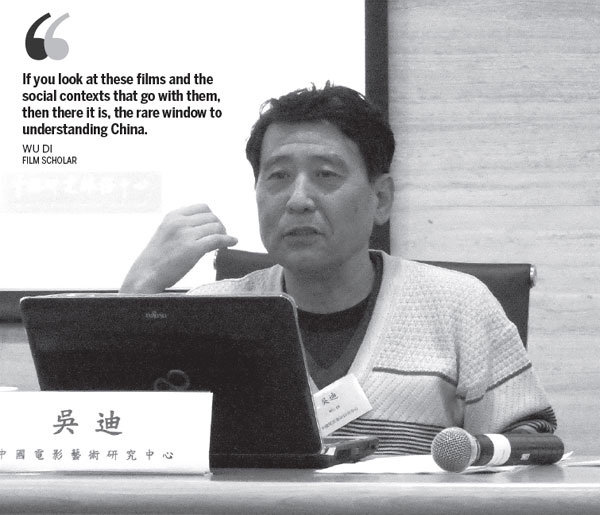 |
|
Wu Di compiles the book Zhong Xi Feng Ma Niu to reflect his thoughts on film, culture and society since New China was founded in 1949. Provided to China Daily
|
Film scholar Wu Di has little appetite for stars, awards and special effects. He seeks a true reflection of society in Chinese cinema, he tells Sun Ye.
Film scholar Wu Di remembers a tap on his shoulder, 20 years ago. A fellow researcher from the Beijing Film Academy asked him: "Hey, brother, where have you been making money lately?" Wu was startled. He hadn't seen the person at the academy for a while, at a time when making a fortune had suddenly become a common vision, even among intellectuals in Chinese cinema.
"I was dedicated to my research. I was with my students. And I didn't get it," Wu, now a researcher at the China Film Art Center, says of the meeting.
That zeitgeist, or "spirit of the time" as the German expression goes, may be enough to explain what Wu felt back then.
"Wealth above everything else" was the prevalent idea, Wu says. He talked about this attitude to audiences at lectures in Sweden's Lund University in the late '90s as part of the series "Chinese films and Chinese culture".
His book - Zhong Xi Feng Ma Niu (loosely translated as China and the West, Different as Cattle and Horses) - first published in 2004, reflects Wu's thoughts on film, culture and society since New China was founded in 1949. The second edition was released earlier this year.
Wu, 63, finds that the film Strangers in Beijing (1995) mirrors his own experiences. It talks about the lives of a dozen young intellectuals who face shortage of money yet struggle to fulfill their dreams in an increasingly heartless city.
"It was a time when making a photocopy at the city library was three times more expensive than outside (the compound)," he says. "Think about its weight on scholars, who were skimping to carry on their studies."
To foreign students with an interest in China, Wu has presented Chinese films that clearly show "what society was like". The West has been well-versed with China from its films in the 1930s, but there isn't much understanding of the time thereafter, he says.
He seems to care little about film stars, awards and special effects. A film's content makes all the difference to him. "If you really want my rankings for today's films, honestly, they are just not good enough."
We Recommend:
